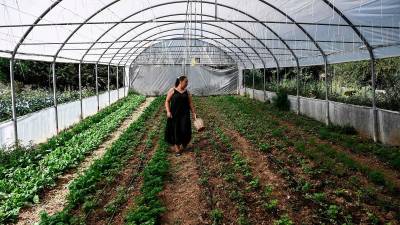THESSALONIKI: Greek farmer Anna Aivazidi feels profound injustice over the massive European Union farm subsidy scandal that has penalised genuine producers.
Aivazidi receives only 300 euros annually in subsidies while struggling daily to maintain her farm operations.
She insists that financial support must be directed exclusively towards actual agricultural producers.
Thousands of Greek farmers claim they have suffered for years as others illicitly profited from a scheme allegedly aided by government officials.
The fraud originated from a 2014 EU Common Agricultural Policy reform that shifted subsidies from livestock to land ownership.
Greece’s incomplete land registry at that time created significant ambiguity over property ownership across the nation.
Farmers were permitted to declare land owned anywhere in Greece to access subsidy payments under the new system.
Non-farmers with political connections subsequently joined the scheme attracted by the potential for easy money.
Former OPEKEPE vice-president Moschos Korasidis explained that fraud involved individuals declaring public pastures without being genuine farmers or livestock owners.
Genuine farmers lost approximately 70 million euros each year according to his estimates.
Wheat and cotton grower Giorgos Drosos described the operation as a well organised criminal network requiring political protection.
Greek authorities currently estimate at least 23 million euros in EU farm subsidies were fraudulently claimed.
The European public prosecutor’s office suggests the actual financial damage could be substantially higher.
Cotton farmer Pavlos Spyropoulos reported that legitimate subsidies were cut by 70% while phantom farmers received thousands.
An EU investigation has revealed extensive fund abuse within OPEKEPE, which distributes over three billion euros annually to 680,000 farmers.
The European public prosecutor’s office stated that illegal practices may have been systematically organised with agency official involvement.
The probe primarily examines the period after 2019 under Prime Minister Kyriakos Mitsotakis’s conservative government.
Mitsotakis maintains that the fraud began in 2016 and his investigated agriculture ministers bear no criminal responsibility.
The conservative party’s former EU funds coordinator resigned in August while denying any wrongdoing.
The EU investigation found most suspicious claims originated from Crete, where Mitsotakis’s family holds longstanding political influence.
OPEKEPE data shows Crete received about 80% of total pasture subsidies between 2017 and 2020.
Crete registered 13,000 new farmers between 2019 and 2025 as livestock numbers supposedly doubled.
Mitsotakis emphasised that state auditors have already recovered 22 million euros from 1,000 fraudulent accounts.
He acknowledged that New Democracy party members would inevitably be involved in such an extensive corruption case.
Investigators are examining improbable declarations including pastures in archaeological sites and banana plantations on Mount Olympus.
Federation head Nikos Kakavas asserted that politicians were aware of the scheme which operated like a business.
He credited the European Prosecutor’s Office for intervention after years of unheeded warnings.
Greek geotechnical chamber official Athanassios Saropoulos highlighted statistical impossibilities such as Crete’s low milk production despite high animal registrations. – AFP
